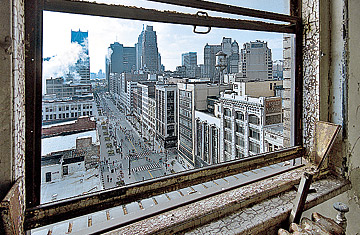
View of downtown Detroit through a window of the Broderick Tower on Woodward Avenue, 2005.
(3 of 5)
The '67 riots sent thousands of white Detroiters fleeing for the suburbs. Even if black Detroiters with financial resources wished to follow, they could not: the de facto segregation was virtually de jure in most Detroit suburbs. One suburban mayor boasted, "They can't get in here. Every time we hear of a Negro moving in ... we respond quicker than you do to a fire."
Soon Detroit became a majority-black city, and in 1973 it elected its first black mayor. Coleman Young was a talented politician who spent much of his 20 years in office devoting his talents to the politics of revenge. He called himself the "MFIC"--the IC stood for "in charge," the MF for exactly what you think. Young was at first fairly effective, when he wasn't insulting suburban political leaders and alienating most of the city's remaining white residents with a posture that could have been summed up in the phrase Now it's our turn. But by his third term, Young was governing more by rhetoric than by action. These were the years of a local phenomenon known as Devil's Night, a nihilistic orgy of arson that in one especially explosive year saw 800 houses burn to the ground in 72 hours. Violent crime soared under Young. The school system began to cave in on itself. When jobs disappeared with the small businesses boarding up their doors and abandoning the city, the mayor seemed to find it more useful to bid the business owners good riddance than to address the job losses. Detroit was dying, and its mayor chose to preside over the funeral rather than find a way to work with the suburban and state officials who now detested him every bit as much as he had demonized them.
When Young finally left office in 1993, he bragged that Detroit had achieved a "level of autonomy ... that no other city can match." He apparently didn't care that it was the autonomy of a man in a rowboat, in the middle of the ocean, without oars.
But Young isn't the only politician to blame. In 1956, when I was 8 years old, my Congressman was John D. Dingell. There are people in southeastern Michigan who are still represented by Dingell, the longest-serving member in the history of the House of Representatives. "The working men and women of Michigan and their families have always been Congressman Dingell's top priority," his website declares, and I suppose he thinks he has served them well--by resisting, in succession, tougher safety regulations, more-stringent mileage standards, relaxed trade restrictions and virtually any other measure that might have forced the American automobile industry to make cars that could stand up to foreign competition.
By so ably satisfying the wishes of the auto industry--by encouraging southeastern Michigan's reliance on this single, lumbering mastodon--Dingell has in fact played a signal role in destroying Detroit. He was hardly alone; if you wanted to get elected in southeastern Michigan, you had to support the party line dictated by the Big Four--GM, Ford, Chrysler and their co-conspirator the United Auto Workers. Anything that might limit the industry's income was bad for the auto industry, and anything bad for the auto industry was deemed dangerous to Detroit.
